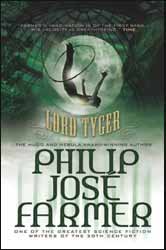|
Click here to return to the main site. Book Review
Lord Tyger lives an idyllic life in the small confines of the jungle valley which is all that exists of reality. He spends his time sleeping with the local tribal women, catching prey for his lion and questioning his parents about the world and god. His parents give him confusing explanations for his existence, which makes Tyger question everything they tell him, but the world is small, so Tyger hunts and wars, whilst all the time the birds of god look on, flying high above the jungle with angels as passengers... Lord Tyger (1970) is a reprint of a book, which can be justifiably thought of as some of Philip José Farmer's best work. Like his contemporary fellow writer, Robert Silverberg, Farmer wrote much, including sixty novels and over a hundred short stories, many exploring the same themes of religion, sexuality, heroes and anthropology. This extensive output meant that some of his work, whilst interesting, was of dubious quality. He is most famous for the two series Riverworld and World of Tiers. Like all writers Farmer starts with the central question of ‘what if’? What if you were so rich you could make any dream come true and what if that dream were to recreate your most favourite character, Tarzan? It’s difficult not to read Lord Tyger without thinking of The Truman Show (1998) as the basic theme of both, a man trapped in a fake life, slowly discovering the truth about his world, which is a shame as the book predates the movie by nearly thirty years. Tyger finds the inconsistencies in his parents explanations of the world troubling, not that he is initially aware that the two dwarfs have been hired by Boygur, a millionaire who dreams of recreating Tarzan, in the flesh. The inconsistencies in his world start to pile up - the difference between his family and those he sees around him, and the large birds in the sky that seem to be able to hover with swiftly spinning wings. Things finally seriously unravel when an anthropologist is shot down in the valley. With her she brings knowledge of the outside world and Lord Tyger goes in search of his maker. When the book was published it was criticised for it sexual descriptions, which today seem relatively tame, Farmer seems to be interested to prove that, even though Edgar Rice Burroughs was one of his favourite authors, the premise behind Tarzan was flawed. He produced, what could only be described as a pastiche of the novel, though given the time length between the two authors, it would be fair to say that, in his description and structure that Farmer out-writes his own hero. Farmer takes a far more erudite view of the noble savage, drawing, as he does, on many more years of anthological studies; Tyger is man, not born of innocence, but man born devoid of any unrestrained moral code. Tyger is not essentially evil and so makes for a sympathetic character. The reader finds himself in the curious godlike position, aware that the birds are helicopters and that the situation bears a striking similarity to the first Tarzan book. Farmer peppers the narrative with clues, including the cabin with the story books. Though the reader is also in a position to realise that Tyger is no noble Tarzan, nor does he adapt to the outside world as readily as Tarzan did, even though Boygur has recreated Tarzan's tragic early life. Although Farmer did not win the Hugo for this book, it must stand as one of the highlights of the genre, with its mix of the pornographic and naive iconography, it’s not a book that is easy to dismiss. 10 Charles Packer |
|---|


